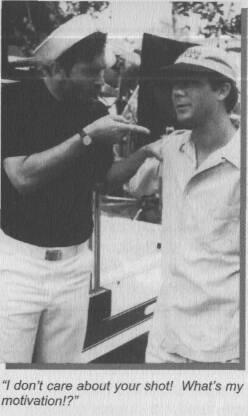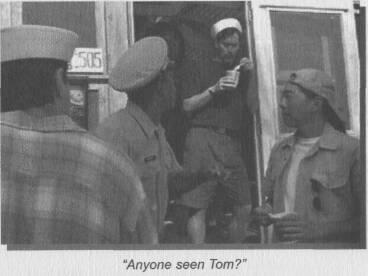If Chins Could Kill: Confessions of a B Movie Actor (44 page)
Read If Chins Could Kill: Confessions of a B Movie Actor Online
Authors: Bruce Campbell
Tags: #Autobiography, #United States, #General, #Biography & Autobiography, #Biography, #Entertainment & Performing Arts - General, #Entertainment & Performing Arts, #Actors, #Performing Arts, #Entertainment & Performing Arts - Actors & Actresses, #1958-, #History & Criticism, #Film & Video, #Bruce, #Motion picture actors and actr, #Film & Video - History & Criticism, #Campbell, #Motion picture actors and actresses - United States, #Film & Video - General, #Motion picture actors and actresses

"Okay, the first shot is here. We see you in the doorway, Bruce. Then, the second shot comes swooping around to reveal Claire at the window. After that, I've got this great shot of you over at the table. You sit and we track in to this movie-star close-up. Sound good?"
"Yeah, if I was the cameraman," I countered. "How did I get to the table and why was I in the doorway? Maybe we should back up a second."
In rehearsing a scene, I like to block first -- just like a play. It sounds so basic and elementary, but it's becoming a lost art. In my first half dozen films, the concept of blocking wasn't foremost in my mind -- it was more like,
Cool, I'm working on a film.
After the goose bumps wore down and I got a better sense of what was going on, it seemed like the basics were being ignored seventy-five percent of the time.
Any film set, regardless of how fast it's moving, can spare the time to let the actors go through the scene, line by line, so everyone gets a sense of the movement. Once that's done, I frankly don't give a rat's ass how the director wants to shoot it, or in what order.
Now that the actor is happy, what does he bring to the party in exchange? This leads me to the topic of memorization. An actor must decide how well he or she wants to learn the material at hand.
The Hudsucker Proxy
was a study in contrasting acting styles. Jennifer Jason Leigh showed up at the first day of rehearsal and knew every one of her many lines
cold.
She also made an early decision, right or wrong, to play the role in a very specific way -- speech patterns and all -- and it was now just a matter of committing it to film.
Tim Robbins, on the other hand, liked to "warm up." He held the script in his hands through most of the rehearsal process and enjoyed six or seven takes on film to get where he needed to be.
I'm not suggesting that either method is best, but they are very different. Becoming intimately familiar with the script can allow an actor to explore other aspects of performance -- like tone, pacing, etc. Actors who show up on a film set not knowing their lines (and you'd be astounded at the high ratio) have only one hope for the day: get through it the best they can.
I was determined to know my lines for the pilot episode of
The Adventures of Brisco County, Jr.
as well as I possibly could. Aside from a great respect for the writing, I wanted to be ready for anything. Deke Anderson, an actor buddy of mine, put me through the paces of memorizing to the point where he could toss out any cue line in the script and I knew the response. We called this little game, "Stump the Actor."
This preparation allowed me to be more accommodating to other actors because I wasn't solely concerned with the lines. The downside of over-prepping is that you run the risk of losing quirky elements that make some performances very appealing. On the other hand, a loosey-goosey approach can throw off the rhythm of the other actors and increase the likelihood of forcing the director to film more angles to cover themselves in editing.
Some actors play the dirty little game of screwing up their lines in every take except their close-up. It's funny how an actor can bumble about during wide shots and medium shots, then become super-focused, alert and competent when that fat 135-mm lens comes out. That's when, as an actor or director, I just want to slap them silly. I don't really live or die for close-ups -- I find them too restrictive and technically oriented. By delivering a consistent performance, regardless of the shot, it allows the director to edit freely, and assemble the best possible scene.
Aside from basic disciplines, there are intangible qualities that actors can embrace or reject. For example, they must ask themselves,
Should I eat lunch with the crew?
This may seem snobbish, but it's an important decision whether to acknowledge the people who support what you do, or whether to keep them at arm's length.
You'd be surprised how many actors eat by themselves. I have never had a problem mingling "below the line." I figure we're all on the same sinking ship together, and particularly if the shoot is long and hard, I'll take all the friends I can get.
Actors must also decide how much they want to know. Should they make the effort to become acutely aware of what every other crew member does and their relationship to it, or should they just act? Personally, I feel that all actors should attend a filmmaking workshop because it would give them a far greater appreciation for all of the hard work done around them.
To me, it works this way: You could give the performance of a lifetime, but if the shot is out of focus because you didn't take the effort to mark out your movements with the focus puller, then you've boned yourself because the take can't be used under any circumstance. I like to get very familiar with the camera crew and what their needs are. I have on many occasions made "deals" with the camera operator.
"Okay, look, I promise not to go any closer than this (and I'd demonstrate), and I won't go any further away than this..." If an actor really wanted to, he could also make himself familiar with camera lenses and their many uses. Most establishing shots, for example, use a wider angle lens, in order to capture the full view of a building or landscape. If the actor is involved in the shot, his range of motion is almost unlimited, like it would be in a play. When it's time for the big close-up, a "longer" (or telephoto) lens is often used. It makes the actor look cool and powerful, but it also makes focus and movement far more critical. On top of that, if there is less light available, the depth-of-field is reduced and the focus puller is more likely to have difficulty keeping the shot sharp. Knowing this, an actor can be a great help to that department.
Unwittingly, actors can be their own worst enemies. My wife, Ida, worked with an actor, Eric, who mumbled all of his lines because he loved to redo his performance in post-production. This is problematic on several fronts -- aside from making the sound man your instant enemy (he almost got in fistfights with Eric daily), you are forcing the other actors to guess when you're done talking.
I make it a point to warn the sound team if I'm going to do something unexpected that would either blow their headphones off or cause them to dive for the gain knob. It's really just common sense -- if I bone them, I'm gonna find myself replacing the dialogue later, dialogue that I might not want to do over again.
On a film shoot, an actor spends most of his day waiting around. To pass the time, I've seen them read, run lines, make whoopee in their trailer, smoke crack, sleep, or simply hang out with the other actors, smoking cigarettes and complaining about their agents.
In the case of
McHale's Navy,
it was Tom Arnold's mission to see how
little
time he could spend on the set every day. Granted, the temperatures were blistering, but you didn't see Ernest Borgnine racing back to his trailer after
every take.
Here was a guy, an Academy Award winner, in his late seventies if he were a day, in full dress uniform, and he never left the set. Ernest would find a piece of shade, remove his hat, and wait patiently until he was needed. Production assistants, concerned for his well-being, constantly hovered about.
"Can I get you some water, Mr. Borgnine?"
"No thanks, son," he'd reply politely. "I'm just fine."
Ernest represented the old-school mentality of, "Let's quit crapping around and get this sucker in the can," and I really admired it. I think many actors today have learned some awful habits that have nothing to do with their craft -- they have studied too long at Pain in the Ass University and graduated with honors. How does this start and where will it end?
I worked with a seasoned actor, John Mahoney, who once played the father of a big action star. For a particularly dramatic scene, they naturally filmed the star first. When the time came to turn the camera around and film the supporting actor, Mr. Big-Shot was nowhere to be found and this poor fellow had to perform opposite the script supervisor -- now that's class.
John, who is one of the nicest guys you'll ever meet, also played the part of an evil hospital administrator. The good-guy star, Ray, felt that he had to "hate" John on and off the set. Every time John came into the makeup trailer, Ray would bolt out the other end and all efforts at making small talk were rebuffed. Much to John's shock, Ray approached him at the end of the shoot.
"John, it was really great working with you," he said -- all smiles.
"I really wish I could say the same, Ray."
In my opinion, there's method acting and there's just being an asshole -- some actors clearly can't make the distinction.
41
FANALYSIS
Why does celebrity fascinate us? What makes us care whether a princess divorces a prince, or what the inside of Kevin Costner's home looks like? Personally, I think the answer lies in the perception that celebrities have something we don't, whether it's money, fame, or a seemingly charmed life.
I wrote a fan letter to Steve McQueen because I thought he was the coolest guy on earth -- he could race cars, put out burning buildings and get all the beautiful babes effortlessly. Typically, my letter to him was addressed, "Steve McQueen -- Hollywood," and I never got a response.
In the case of Princess Diana, I think we found ourselves glued to her divorce proceedings because, deep down, we still wanted to believe that fairy tales were real. Her death united us in shock and horror because it was a tragedy of Greek proportions.
I was in Paris when Princess Di was killed. I was, in fact, out for a leisurely stroll with my agent, Jeff Goldberg, about a mile from the scene of the crash and close to the time of her death. It wasn't until the next day that I found out what had happened, ironically, from my wife in the States. Bad news travels fast I guess.
Personally, Diana's death haunted me far more than other celebrities that have recently passed. When Versace was gunned down in Florida, for example, I remember commenting about how cold-blooded it was, but were it not for the manhunt and ensuing media frenzy, I'm not sure how much more I would have thought about it.



